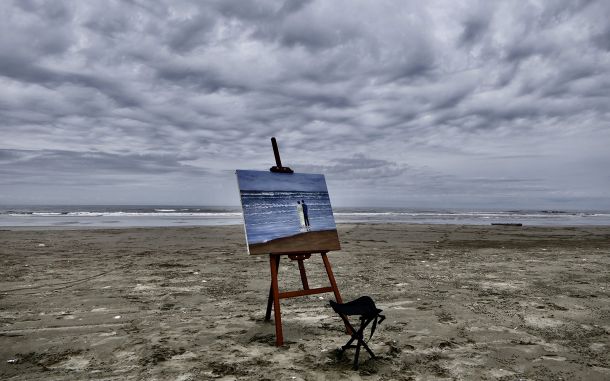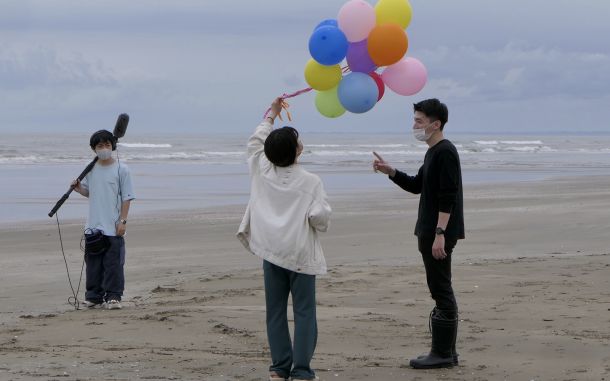TRACÉ
A beach off the coast of Japan. A man wakes up and sets out to explore the surroundings in search of a woman. Guided by a few clues scattered along the shore, he eventually finds her. However, once side by side and looking out to sea, their eyes seem inexplicably tinged with melancholy. Is this truly a reunion?
A unique cinematic experience: consisting of a single-sequence shot, shot and played backward, then edited in reverse, this film offers a singular reflection on time, reality, as well as on the encounters and separations that punctuate human life.

FESTIVALS - DISTINCTIONS
2025.12. The Psychedelic Film and Music Festival (New York, USA). Official Selection.
2025.09. Florence Indie Film Festival (Florence, Italy). Awarded Best First Time Filmmaker (short).
2025.06. Arthouse Festival (Beverly Hills, USA). Awarded Best International Short.
2025.05. Peshawar International Film Festival (Peshawar, Pakistan). Semi-finalist.
2025.05. Stockholm City Film Festival (Stockholm, Sweden). Finalist for Best Actress Award, Semi-finalist for Best First Short Film Award.
2025.05. Chameleon Film Festival – Contemporary Visions (Naples, Italy). Awarded Best Film, Best Director, Best Actress & Best Actor at the monthly competition.
2025.03. Philippines Première (Makati, Manila).
2024.04. Tokyo Lift-Off Film Festival (Tokyo, Japan). Official Selection.
2023.12. Kansai Première. (Osaka, Japan).
2023.11. Nasu Short Film Festival (Nasu, Japan). Official Competition. Japan Première.
2023.09. Camera Japan Festival (Rotterdam & Amsterdam, The Netherlands). Official Selection. World Première.
2023.08. Rhode Island International Film Festival (Rhode Island, USA). Semi-finalist.
TRACÉ is available on Gene Theatre & on U-NEXT (Japanese short film distribution platforms) as well as on FilmFreeway and ShortFilmDepot platforms.
DATA
Poetic drama /2023 / 17min / Ratio: 2.35:1 /Japan - Belgium - France
Cast: Yuta Ohashi (man), Yukina Kuno (woman), Patrice Boiteau (painter), Ai Sasaki (runner), Akari Ishiyama (woman with balloons), Ryo Haruyama (woman with dog), Ikkyu (dog). Director: Olivier Kazuma. Screenplay: Olivier Kazuma. Producers: Olivier Kazuma, Raf Keunen, Patrice Boiteau. Assistant Directors: Ryotaro Tamagawa, Ai Sasaki. Location managers: Taishi Watanabe, Haruka Saito. On set coach: Ai Sasaki. Director of photography: Shinnosuke Goto. Assistant camera: Atsushi Fukui. Color grading: Ryota Mori. Music: Raf Keunen. Sound design & mixing: Jeroen De Meyer. Boom operator: Ayu Hosoya. Painting: Mayumi Michihiro. Credits: Kakeru Masuda. Still photographer: PABO. Song ‘Ocean Tides’ written and arranged by Raf Keunen and Stefan Huber. Lyrics by Raf Keunen, performed by Raf Keunen and Stefan Huber. Special thanks: Riana Nemoto, Kouki Komatsu, Ryo Sasaki, Naoko Fujii, Shuko Tanaka, Motoharu Yamazaki, Stijn Vandeputte, Stijn Deconinck, Jo Nijns, Séverine Abherve, MSA Agency, FLOW Post Production. Production: OLIFILM, EAR INN, PABO PRODUCTIONS.

NOTES FROM THE DIRECTOR
OVERVIEW
TRACÉ consists of a single shot, filmed and played backwards, then edited in reverse.
At first glance, the story appears to be about a man waking up on a beach and finding the woman he loves. However, the film is structured in such a way that we realize by the end that quite the opposite may have happened, and that the narrative unfolding before our eyes is not based on a single temporal axis. One could even consider that what is depicted in the film is not exclusively a representation of what unfolds over the course of the 17 minutes of screening, but also evokes the past, present, and future of the protagonists. The film is a journey through their universal memories.
THE TITLE
At the end of the film, the initial title, TRACÉ, shifts to ÉCART. TRACÉ is therefore an anacyclical title in that, whether read forward or backward, it makes sense in absolute terms and in relation to the film's universe. TRACÉ evokes both the natural contours of the coastline and the life trajectory of the protagonists. ÉCART, for its part, evokes the gap between the audience's initial perception of the world the film presents and the new approach to this world once the chronology of events is called into question. More broadly, it touches on the gap that exists in our perception of time and reality.
OBJECTS
Several important objects appear in the film. The first of these is a metronome. This is a highly symbolic object, as the metronome's pendulum moves in a completely reversible manner. Of course, at some point, its movement will be frozen, but as long as it remains in motion, there is no notion of forward or backward.
The cassette player, which appears in the middle of the film, is another important element: although the film uses sound effects to indicate the direction of time, the cassette tape in the player can freely scroll in either direction.
On the other hand, there are objects whose movement is beyond our control, such as the balloons that, at the end of the film, rise irreversibly into the sky after a young woman lets them go.
FILMING
Shooting and performing the entire film backward required a tremendous amount of preparation and numerous rehearsals from the crew and actors. The main actors had to walk backward, perform every movement backward, and master every change in facial expression.
In acting, reason normally precedes action, but during filming, with everything reversed, the actors had to learn to perform differently, as if they were performing a choreography. The camera also had to move ahead of the actors to avoid any disruption during the playback reversal. It was a colossal undertaking.
SOUND
Since the film was shot backwards, we had to design a soundscape from scratch. Jeroen, the soundtrack designer, had to "dress" a silent world and bring a grain of reality and truth to the film. All of his efforts were enhanced by the magnificent performance of Raf, who composed the film's music simultaneously with the sound effects. I must say that the beautiful and eloquent musical score brought a dimension to the film that I hadn't initially envisioned.
TIME
The world around us has always been in constant change, but I wonder to what extent the emergence of new technologies has affected our notion of the passage of time. In any case, despite my young age, I share the sentiment of many people who believe that time is passing faster and faster, to the point of dizzying speed, and that it is more necessary than ever to reflect on how we should guide our lives and face the time allotted to us.
Humans have always been interested in the invisible, the passage of time, and the notion of reality. It is in this continuing interest that I decided to make this film focused on the theme of time.
I have long perceived time as something simple and obvious, surrounded by numerous landmarks like clocks and calendars, but now it is a fascinating concept for me. And the more I question it, the more it shrouds itself in mystery and confronts me with contradictory considerations.
How can I express these contradictions and this mystery within the framework of a cinematic work? It was while reflecting on this question that I concluded that I needed to design a film shot in sequence shots and project it backward.
I therefore hope that this work will provide an opportunity to reflect on the notion of time.
PROFILE OF THE DIRECTOR
Olivier KAZUMA was born on January 27, 1995, in Osaka, Japan. Having grown up surrounded by numerous literary and film works, he decided to devote himself to filmmaking. At university, he majored in performing arts to broaden his horizons. While still a student, he wrote and directed his first play, "Papillon," and then participated in more than 20 theater and film productions as an actor, producer, writer, and director. After graduating, he worked first as an assistant director for television series and then as an editor. A journalist and reporter since 2022, he specializes in international topics and covers events such as the G7 summit in Hiroshima and the Paris Olympic Games.
In 2023, alongside his work as a journalist, he wrote and directed TRACÉ, his first film produced after graduating.
In May 2025, he completed is his second film: 23:07.









